Video: Kelvin Thomson on Australia's magic pudding population myth - SPA public seminar
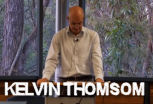 “Face up to the fact that the Liberal, Labor and Green Parties are not going to move on this issue on anything other than the point of an electoral gun, and conduct ourselves accordingly.” We have to deal with the magic pudding myth which says the world's poor can achieve western standards of living that people living in western countries will be able to more or less maintain their standards of living, that we can maintain our current rate of population growth, and we can protect the environment. It is a lie. You've heard Al Gore talking about climate change and inconvenient truth? Well, this is a convenient lie. It enables environmental groups to duck the population issue, but it is a monstrous and deceitful lie. Researchers who've looked at this say there could be a European standard of living for everyone, with sustainable use of our natural resources, provided the earth's population was no more than two billion. Kelvin also suggests that we ask political candidates if they would support Australia sponsoring a population treaty at the United Nations that committed each country to stabilising its own population. (Speech made at SPA Brisbane Seminar 27 April 2019).
“Face up to the fact that the Liberal, Labor and Green Parties are not going to move on this issue on anything other than the point of an electoral gun, and conduct ourselves accordingly.” We have to deal with the magic pudding myth which says the world's poor can achieve western standards of living that people living in western countries will be able to more or less maintain their standards of living, that we can maintain our current rate of population growth, and we can protect the environment. It is a lie. You've heard Al Gore talking about climate change and inconvenient truth? Well, this is a convenient lie. It enables environmental groups to duck the population issue, but it is a monstrous and deceitful lie. Researchers who've looked at this say there could be a European standard of living for everyone, with sustainable use of our natural resources, provided the earth's population was no more than two billion. Kelvin also suggests that we ask political candidates if they would support Australia sponsoring a population treaty at the United Nations that committed each country to stabilising its own population. (Speech made at SPA Brisbane Seminar 27 April 2019).
Text for speech: The Political Impasse - Where To From Here?
Speech to Sustainable Population Australia National Conference Saturday 27 April 2019.
My first response to the question “Where to from here” is that we need to seize the high moral ground. Now in the political party which I was a member of for over 40 years, there is a saying “In the race of life, always back the horse called self-interest. It doesn’t always win, but it always gives you a bloody good run for your money”.
And because population stability would serve so many Australians, particularly younger ones, better than rapid population growth, it is indeed very tempting for us to pitch our arguments in that direction. But the population debate is not fundamentally a debate about putting a few more dollars in people’s pockets. It is a debate about values. It is a debate about what kind of world we are going to live in, and what kind of world we are going to pass on to our children.
I don’t know about you, but I am sick to death of commentators and social media smart alecs trying to paint anyone who raises the issue of population as racist or selfish. The opposite is the truth, and we should unashamedly claim the high moral ground.
In August it will be ten years since I first advanced in the Federal Parliament two propositions - that the world had a population problem, and that Australia has a population problem.
As that tenth anniversary approaches I have reflected on what has been achieved since then, and the short answer is, not much. There are few signs of a shift towards population stability and sustainability either globally or here in Australia, and the debate about population continues to be dominated by the greed of the political right, and the vanity of the political left.
But to get a clearer perspective on the population issue, I prefer to go back not 10 years to 2009, but 50 years to 1969. In the summer of 69 Bryan Adams was playing his guitar till his fingers bled. And I was a teenager getting interested in the environment and politics. My father and I got involved in the campaign to save the Little Desert and the Lower Glenelg River in Victoria from being cleared for agriculture.
That successful campaign saw the establishment of the Victorian Land Conservation Council. It was a time that seemed to me to mark the establishment of the modern conservation movement, not just in Victoria, but in many other parts of the world.
I had a very rosy view of the future. I thought Australia’s pioneers had made a lot of environmental mistakes, but we were learning from those mistakes, and in future we were going to properly protect our unique and beautiful birds, plants and animals.
I had a pretty rosy view about everything else, too. I thought that not only were we lifting our environmental game, but that EVERYTHING would get better.
Yes we were involved in a stupid war in Vietnam, but I thought that that the Second World War and the Holocaust committed on the Jewish people was so wicked and so evil that we had learned from that. That there was an appetite for peace. That war and conflict would become a thing of the past, and things would continue to get better and better.
So what has actually happened in the last 50 years? The world’s population has more than doubled - 3.6 billion back then, 7.7 billion now. Australia’s population has also more than doubled - from 12 and a quarter million then to 25 million now.
The effect of this on the world’s wildlife has been nothing short of catastrophic. The latest WWF Living Planet Report says that since 1970, 60% of the population of all mammals, birds, reptiles and fish has been lost. 60% in less than 50 years!
This is terrible, it is a disgrace, and it makes an absolute mockery of the idea that we’re decoupling growth from environmental damage- that we can continue to grow, and our wildlife won’t disappear. Let me repeat - in the last 50 years our numbers went up by over 50%, and the world’s wildlife went down by 60%.
Co-incidence? Hardly. As has been noted by The Overpopulation Project, the total weight of vertebrate land animals 10,000 years ago was - Humans 1%, Wild Animals 99%. Today it is the Wild Animals that are the 1%. Humans are 32%, and our livestock are 67%.
So in my view there are two aspects to claiming the high moral ground. The first is to focus on this environmental havoc and destruction. Part of this should include being involved in the climate change debate. For example, the 2018 Victorian Greenhouse Gas Emissions Report shows total net greenhouse gas emissions went up by 7% between 1990 and 2016. Transport emissions went up by 39%, due to an increase in the number of passenger vehicles by over 70,000 each and every year.
The report explicitly noted that “population growth is an important driver of emissions trends in a number of sectors and sub sectors”.
So Victoria’s rapid population growth of over 100,000 each year fatally undermines all the good work being done by Government Departments and agencies, Councils, business, community groups, families and individuals to reduce our greenhouse emissions. It is indeed pretty hard to reduce your carbon footprint when you keep adding more feet.
We need to cultivate a knowledge and love of the natural world. We should be demanding that environmental education be taught in schools, and that our children are given contact with nature. People will value and protect what they know and love, and the level of ecological ignorance and illiteracy in the year 2019 is frightening.
Dr Harry Recher says we need to act as if other species mattered as much as our own, and accept that we have a moral responsibility to share resources with other species, rather than sacrificing other species for pointless human aggrandisement. The ultimate goal of human societies is not ever more economic activity or the heaping up of endless wealth, but creating communities that allow their members to live good lives.
Dr Recher calls out the failure of the modern environmental movement to address overpopulation. He says that for the most part Australia’s environmental groups fail to discuss population matters, leaving Australia’s population policy to be made by greedy businessmen and politicians lacking in environmental concern. He says we need more discussion of population matters, not less.
I also agree with Dr Freya Mathews, who says that taking biodiversity preservation as the central goal of conservation sets the bar too low. Preventing species from becoming extinct is too modest.
Conservationists want to preserve abundant, wild nature. When we get to the point where our children will only see a platypus or a bandicoot in a zoo or a cartoon, or we’re down to our last few hundred lions and tigers, being restricted to isolated disconnected refuges, more and more of which are gated, high security compounds, then we’ve pretty much lost the plot.
To its great credit, Zoos Victoria has an Extinction Denied Program that includes captive breeding Orange Bellied Parrots. However some of the Parrots can’t get enough feed in the wild to get the strength to fly across Bass Strait to Tasmania, which is Orange-bellied Parrot custom and practice. So Qantas has been flying them across in planes. It feels like life imitating art, where Air New Zealand commercials star a white duck flying by plane across the Tasman.
Now I give full marks to Zoos Victoria and Qantas for their efforts and commitment, but when the birds need a plane to get across Bass Strait, this is not nature in all its beauty and awe-inspiring diversity, these are pathetic splintered remnants of a world we’ve laid waste to.
Dr Mathews says we have to concede that wild animals are, like sovereign peoples, entitled to their territories and ecological estates. The biosphere was shaped by wildlife as much as it was shaped for us and by us, and belongs to them as much as it belongs to us. We have no right to dispossess wild things of their ranges or degrade their environment to the point where it can no longer sustain them.
So we need to seize the high moral ground by focusing on the state of the environment. The 15000 scientists from 184 countries who issued the World Scientists Warning to Humanity in 2017 said we are jeopardising our future “by not perceiving continued rapid population growth as a primary driver behind many ecological and even societal threats”. They said “By failing to adequately limit population growth, ....humanity is not taking the urgent steps needed to safeguard our imperilled biosphere”.
One immediate aspect of this, which I encourage you to contact your election candidates and representatives about during this election campaign and indeed beyond, is vegetation cover or tree canopy cover. We need our trees and plants and grasses. It’s not just an environmental question, it’s a public health one. The good news is that drones and satellite imagery and the like enable vegetation cover to be monitored with a degree of precision we’ve never had before. The bad news is that our vegetation canopy cover is declining. So I urge you to contact your political representatives and candidates and ask them to commit to maintaining, and where possible increasing, the vegetation canopy cover in your electorate, on both public and private land. People simply have to stop bulldozing and chopping trees and shrubs down. It has to stop.
The second aspect of seizing the high moral ground is to put population in a global context. Much of our discussion focuses on Australia, as it should, but it seems to me that (a) unless there is action in other countries, no matter what we do in Australia the world is still going to go to hell in a handbasket, and (b) much of our credibility and moral authority comes from taking the global view.
We need to build alliances with like minded people in other countries, and particularly build alliances across religious and ethnic divides.
An important aspect of focussing on the issue of rapid global population growth is that there is a magic pudding myth which is implicit in much of the political debate, including from politicians and activists from the left, who really ought to know better. It goes like this -
The world’s poor can achieve Western standards of living
People living in western countries will be able to more or less maintain their standards of living
We can maintain our current rate of population growth
We can protect our environment.
It’s a lie. You’ve heard Al Gore talking about climate change as an inconvenient truth; well this is a convenient lie. It enables environmental groups to duck the population issue. But it is a monstrous and deceitful lie. In 2010 a group of researchers who studied this question in depth estimated that there could be a European standard of living for everyone, with sustainable use of our natural resources, provided the earth’s population was no more than 2 billion.
In 2013 Theodore Lianos estimated that we could maintain ecological equilibrium, and all have a per capita annual income of $11,000, with a global population of 2.5 billion or less. If the population is larger than 2.5 billion, which of course it is, ecological and social equilibrium requires lower standards of living.
Like the environmental question, there are ways of raising the global population issue in the current Federal Election and beyond. There has been some great work done by Rob Harding promoting the idea of a United Nations Global Population Stabilisation Treaty. This seems to me to have a lot of potential. Indeed it should be much easier to reach agreement around the idea of each country stabilising it’s own population, than to get agreement around emissions reductions targets in the Climate Change talks, where of course serious questions of global equity and historical legacies arise.
I encourage you to contact your candidates and elected representatives, during the election campaign or beyond, and ask them - “Would you support Australia sponsoring a Population Treaty at the United Nations that committed each country to stabilising its own population?”
We also need to talk about fertility. If you think talking about migration is tough, try talking about fertility in a culture that views pregnancy and childbirth as an unmitigated blessing. But right around the world it has to happen, and indeed some countries or communities have had success with “Two is Enough” type campaigns.
After taking the high moral ground through a focus on the environment and global population growth, we need to acknowledge that neither the Liberal Party, the Labor Party or the Greens is going to do anything serious about this issue except at the point of an electoral gun. This is a very hard thing for me to say. I have spent a lifetime in the Labor Party - I think I attended over a thousand Branch Meetings! - and in many ways I still love the Labor Party.
But these parties, until further notice, are all about suppressing and killing off this issue by any means or devices they can come up with. We need a non-racist party that takes a firm line on population and migration. That is why I have joined the Sustainable Australia Party. It has no time for racists or racism. It believes in the non-discriminatory migration policy. It is a party of the centre. Unlike populist parties of the right like One Nation, it believes in strong action on climate change and to protect the environment. It believes in strong gun laws. It believes in action to tackle indigenous disadvantage.
But it doesn’t accept the trebling of Australia’s migration program which started about 15 years ago. We want to return the program from the 200,000 per annum it is now to 70,000, which is where it used to be - in the Whitlam years and the Keating years it was actually lower than that.
So in conclusion - the question I was asked to answer was “where to from here?” First, seize the high moral ground with a focus on the environment and global population issues. Second, push elected representatives with challenging but not unreasonable asks like maintenance of our remaining vegetation cover, and support for a global population treaty. And third, face up to the fact that the Liberal, Labor and Greens Parties are not going to move on this issue at anything other than the point of an electoral gun, and conduct ourselves accordingly.
And as for the question this Forum asks - “what future do we want for Australia?” - the future I want is one in which my children, and their generation, have the same job security and opportunity we had, and can afford a post secondary education and a house with a garden and the chance to see owls and platypus in the wild the way we could. Oh, and the Orange-bellied Parrots can fly across Bass Strait without a boarding pass.


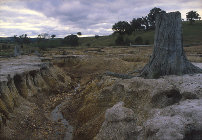
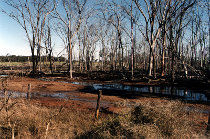
 The plain truth:
The plain truth: 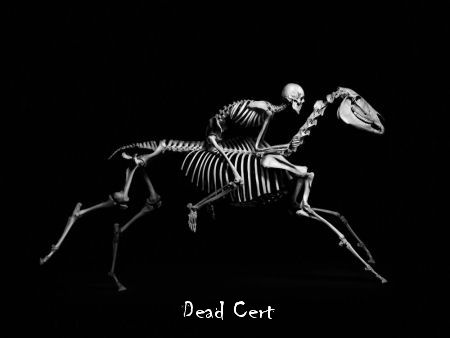 What does this mean?
What does this mean?
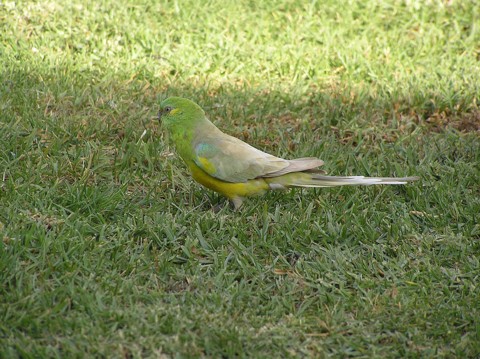
 (saltmarsh coastline typical in Australia source: Wikimedia commons).
(saltmarsh coastline typical in Australia source: Wikimedia commons).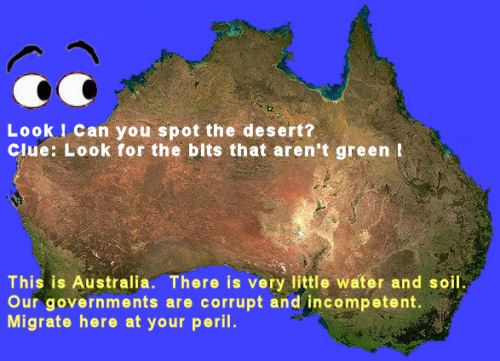
Recent comments